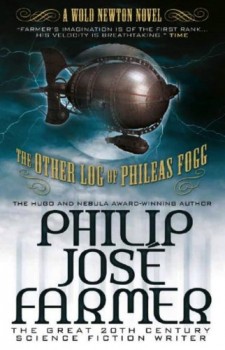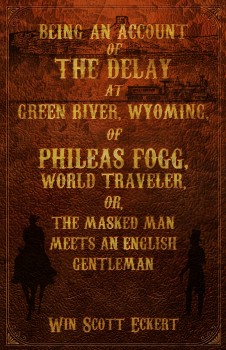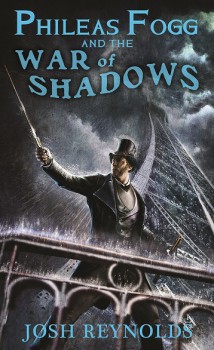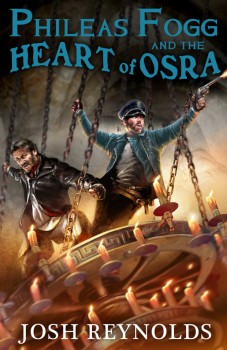Phileas Fogg Finds Immortality

 When Jules Verne created gentleman adventurer Phileas Fogg in his 1873 novel, Around the World in Eighty Days, he had no way of imagining the bizarre turn his character’s chronicles would take a century later. When Philip Jose Farmer added The Other Log of Phileas Fogg to his Wold Newton Family series in 1973, he had no way of imagining that four decades later there would exist a Wold Newton specialty publisher to continue the esoteric literary exploits of some of the last two centuries’ most fantastic characters.
When Jules Verne created gentleman adventurer Phileas Fogg in his 1873 novel, Around the World in Eighty Days, he had no way of imagining the bizarre turn his character’s chronicles would take a century later. When Philip Jose Farmer added The Other Log of Phileas Fogg to his Wold Newton Family series in 1973, he had no way of imagining that four decades later there would exist a Wold Newton specialty publisher to continue the esoteric literary exploits of some of the last two centuries’ most fantastic characters.
Farmer’s concept, in a nutshell, is that Verne’s globetrotting adventure is part of a far larger extraterrestrial conflict between two powerful alien races, the Eridani and the Capellas. Phileas Fogg was raised by the Eridani it turns out and, in the course of Farmer’s work, we learn that Verne’s Captain Nemo (the anti-hero of his 1870 classic, Twenty Thousand Leagues Under the Sea and its 1874 sequel, The Mysterious Island) is not only a Capellan agent, but is also the same man known as Professor Moriarty in Sir Arthur Conan Doyle’s Sherlock Holmes mysteries.
Josh Reynolds was the first author to follow in Farmer’s footsteps in a substantial fashion when he authored two direct sequels to The Other Log of Phileas Fogg for Meteor House: 2014’s Phileas Fogg and the War of Shadows and 2016’s Phileas Fogg and the Heart of Osra. Both books are set in 1889 and see Phileas Fogg coming out of retirement as the extraterrestrial conflict between the Eridani and the Capellas reaches Earth once more. The second of these titles involves Ruritania, the fictitious country from Anthony Hope’s Ruritanian Romances trilogy that began with the famous 1894 novel, The Prisoner of Zenda.
All of this is sure to delight those who embrace the Wold Newton concept that posits a logical and orderly shared universe (in the modern vernacular) for so many classic literary works. Others are more prone to shake their heads in bewilderment while purists may rail at the injustice that no one can stop these seemingly criminal acts of literary speculation.
While I have zero tolerance for the rewriting of an author’s original public domain works (not being amused at the prospect of stumbling across Jane Austen’s Pride and Prejudice and Pederasts on Amazon sometime soon), I have a soft spot for Wold Newtonians. I may not “play the game” myself (just as I absent myself from “the Great Game” of Sherlockians), but I do find the research of Wold Newton scholars such as Win Scott Eckert and Rick Lai to be not only fascinating, but inspiring. The work of Farmer and his acolytes has led me to discover works I might have otherwise missed entirely and has enriched my life as both a reader and a writer determined to pay tribute to the past.

 The aforementioned Mr. Eckert has recently completed Meteor House’s first chapbook, Being an Account of the Delay at Green River, Wyoming, of Phileas Fogg, World Traveler, or, The Masked Man Meets an English Gentleman. The title is certainly a mouthful, but very much in keeping with the fiction of its setting in that and, indeed, in every other respect. It is the attention to detail that makes these particular pastiches work so wonderfully well even if you find yourself shaking your head declaring it didn’t really happen that way.
The aforementioned Mr. Eckert has recently completed Meteor House’s first chapbook, Being an Account of the Delay at Green River, Wyoming, of Phileas Fogg, World Traveler, or, The Masked Man Meets an English Gentleman. The title is certainly a mouthful, but very much in keeping with the fiction of its setting in that and, indeed, in every other respect. It is the attention to detail that makes these particular pastiches work so wonderfully well even if you find yourself shaking your head declaring it didn’t really happen that way.
Eckert opts not to follow Reynold’s lead and deal with Fogg coming out of retirement, but rather sets his abbreviated adventure in a narrative gap during Verne’s original adventure. The geographic and temporal placement gives Eckert an excellent opportunity to work in The Lone Ranger and lay the groundwork for The Green Hornet (the pulp hero who was originally intended to be a relative of the Western masked man by the characters’ co-creators George Trendle and Fran Stryker who introduced them in 1933 and 1942, respectively). The villain of the piece is Sax Rohmer’s Fu Manchu by way of George Alec Effinger’s backstory for the Devil Doctor in a pair of Sherlock Holmes pastiches that would otherwise have slipped into obscurity but for the worth they hold to Wold Newton chronologists. As is often the case when copyright is clearly in force or is murky enough to make challenging fraught with peril, names and identities are sometimes only suggested. While the internet may be crawling with self-proclaimed experts on public domain law eager to argue so long as it isn’t their dime on the line, most publishers prefer not to have to exhaust their resources in court if the author does not have a license.
Some have asked me how I feel about authors incorporating Fu Manchu in their works and sometimes filling in his backstory while I work to meet the terms of the license laid out by the original author’s widow and administered by his literary estate. While it is true that I am, at times, unreasonably proprietary about Rohmer’s characters [the very thought of one of my greatest influences penning a Wild Adventure of Doc Savage and Fu Manchu has been known to send me into fits of early dementia or so certain wags claim], I do remind myself that many hands have offered conflicting accounts of the many lost Sherlock Holmes adventures that Conan Doyle frequently mentioned in passing. The only real canon is the original author’s work. The rest is mere footnotes.
The success of a pastiche lies in the continuation author’s fidelity and abilities and the reader’s willingness to accept them as legitimate heirs. While Altus Press and Meteor House may offer conflicting adventures for Pat Savage, the reader is unlikely to mistake one for the other. Some will choose to reconcile both accounts into one narrative. Others will accept one offering while rejecting the other due to personal like or dislike. Still others will only accept the originals and dismiss any effort to continue a series after the original author as heretical. So it is with my efforts and every other continuation writer. We can only do our very best to rekindle the joy the original works brought us and try to share that joy with our readers and perhaps inspire them to discover lost treasures and seek a creative outlet of their own.
In the meantime, do yourself a favor and order a copy of Meteor House’s first chapbook, Being an Account of the Delay at Green River, Wyoming, of Phileas Fogg, World Traveler, or, The Masked Man Meets an English Gentleman. It will be the time of your life if you let it or that infuriating work you can’t quit thinking about if you don’t. As for me, I count myself fortunate not only to have discovered the works of both Will Murray and Win Scott Eckert in my lifetime, but to have befriended them both. And sure, I would be terrified to have Will Murray for competition so feel free to stop encouraging him to use Fu Manchu as a villain for Clark Savage’s over-achieving son. I have to sign off now. I ixslab nybyl plop.
William Patrick Maynard is the authorized continuation writer for the Estate of Sax Rohmer. His third Fu Manchu thriller, The Triumph of Fu Manchu will be published by Black Coat Press later this year.
[…] OVERTIME. William Patrick Maynard tells how “Phileas Fogg Finds Immortality” at Black […]
Still patiently awaiting your third Fu Manchu novel. For me it depends on the character whether I accept/reject continuations. I have read some James Bond novels beyond Ian Fleming but do NOT accept them as AUTHORIZED continuations. I DO accept the Bantam/Altus Press Doc Savage novels though I quit reading them -I have finally outgrown Doc to my regret but more then thrilled to accept the fairly recent Sinister Shadow-in fact while owning the Belmont Shadow books I only accept th first by Walter B. Gibson ad the remaining eight and the 1994 movie adaptation as a curiouity. Tarzan in much the same way. If the Burroughs estate authorizes it-so be it. I FIRMLY dislike Tarzan-The Lost Adventure due to the tampering with Burroughs manuscript. Had it been left alone and THEN completed I would gladly take back my complaint. I tend to think of an author’s work as sacred. Leave it alone. I accept YOUR Fu Manch books because it’s authorized and someday also hope to track down the Cy Ash novels-someday. Lastly -I only care about Howard’s Conan stories BUT more then willing to accept addition to Solomon Kane. Just saying.
Thanks for the remarks, Allard. I can empathize to a degree. I accept COLONEL SUN as legitimate Bond, but disliked the most recent attempts at period settings. While I enjoyed a couple of John Gardner’s books, I reject as a matter of principle the recent titles that reboot Bond and make him a thirty-something agent. Oddly, Daniel Craig’s movies don’t bother me in the least. I guess I’m more of a purist with books. I read the first Young Bond, but I had the same problem with them that I did with Robert Jordan Conan pastiches (well-written books whose scope is all wrong for narrative continuity with the original work). I think Will Murray is a brilliant writer and while I wouldn’t say he can do no wrong, his batting average is very high. Even though Doc Savage or The Shadow have never been my principal passions, I value them for their historical value. I’ve also watched my son grow into a fan of The Shadow so you never know where a collection will go. I was mixed on Joe Lansdale’s book. Much like Robert B. Parker with POODLE SPRINGS, he accepted a thankless task. I haven’t read all of the Tarzan continuations. I reject the Andy Briggs trilogy because of my problem with reboots. As far as outgrowing a property, that happened to me numerous times. I set them aside and revisit them when my nostalgia is rekindled. If nothing else, I keep them for their worth not as collectibles, but as culture. Finally, I strongly encourage you to read the two Cay Van Ash books as they are excellent. Thank you for your patience. I believe the long delayed TRIUMPH OF FU MANCHU will have a publication date announced very, very soon. The extremely difficult author is promising to release the manuscript to the publisher at last.
Thank you sir. I read Colonel Sun in its first paperback edition with the Sean Connery image and I felt it was very well done. By the time Gardner came on the scene I was over it having discovered Adam Hall’s Quiller there was no going back. My nephew sent me some of his later Bond novels but though they were good they read like the spy in them could have been any one. My affection for Fu Manchu goes entirely back to my teen years-the late 1960s and I got the second Pyramid covers along with the DAW Wrath of Fu Manch so that set is complete. While owning both of your novels I need the second one in hardcover–Barnes and Nobles messed the order up but I’m a bird in the hnd collector. As to The Shadow I was very unimpressed (as a teen) with Return of the Shadow but the seven Bantams helped. The REAL turn around was the Dover reprint of Teeth of the Dragon and the Strenanko paperback covers plus DC’s 1970s series. My only compliant with that run is the idea the Shadow is NOT considerate of others–he goes to great trouble in the pulps to save innocents and keep track of his agents. I tried reading Poodle Springs but failed. In my 20s Chandler was hard for me but in my advanced years have greatly changed my outlook on him how Hammett’s Continental Op holds the heart. Looking forward to your book and having spent almost 30 years tracking down all the Allan Quatermain stories I can wait for you as long as it takes. (Purely side note-when I kid I missed all the innuendo with Fah Lo Suee but as an adult rereading them was a revelation and as always sort of having a crush on her try not to think too deeply about it. You opened on eyes on Karamenah in your first book and haven’t beenn able to think of her in the same way ever since. Always naively thought the Rohmer were all tease no home runs. Sigh.
Sir-one last note on the Shadow for your son. My favorite year of the pulps was 1938–every one a winner. Most of 1937 holds up well also–we’re in what I think of the established Shadow period (pre-Margo Lane) and more action in them then the earlier mystery oriented novels. I HAVE read then all. Had a huge amount of help in the 70s and 80s from Tom Johnson and Jack Deveney back in the day. Collecting the Sanctum editions means in about 4 years I’ll no longer be able to say have one of the few to have read all 325 novels. To my reading enjoyment its hit or miss past 1940. There ARE some gems in the digest period but that is matter of taste.
Thank you again for the kind words, Allard. I tried to stay true to Rohmer while treating the material a bit more realistically. What he delicately describes is sex slavery. I tried to be careful not to tarnish the escapism with too much reality, but I didn’t want to romanticize such a horrible situation either. I just picked up for my son John Olsen’s mammoth tome, THE SHADOW IN REVIEW and Ed Hulse’s FLICKERING SHADOWS chapbook. He now has a complete set of Shadow books (327 anyway), 31 episodes of the radio show, and several of the old serials, B-movies, and TV pilots. Finally, if you truly want a hardcover of my second Fu Manchu book. I list new copies on Amazon at wholesale which I sign. Just go to the listing and look for the NEW copies starting at lowest price and you’ll find my listing. Least expensive way to get a physical copy. No obligation to do so but wanted to let you know. Thanks again for the kind words.
Thank you for your response to my ramblings. Appreciated. Your second novel is one of many I have my eye on from Amazon as finances are such that bills first, then the comics the Fairborn Ohio Bookery Fantasy keeps in my file for me then books then finally DVD TV series. Car repairs can out such a crimp in collecting sometimes. Glad your son has all the Shadow novels. As to Rohmer would have loved more Dream Detective Moris Klaw stories. As to Fu Manchu my favorite was Return and Hand. After he went anti-Communist some of the fire went out of the character but I understand the toll time and series can take on a character and an author. I am sure oyu are aware of the Fu Mancu page on the internet. I like the music theme the web creator uses for it.
I completely understand your limitations speaking as someone who has not had a reliable means of income in over 18 months now. I would hope one gets to see more Morris Klaw sooner rather than later, but yes, it’s a pity Rohmer himself didn’t do more with the character. My favorite Fu Manchu is BRIDE actually. I felt the series lost much after ISLAND, although EMPEROR is not without its small pleasures. It’s good to remember Rohmer was 76 years old when he wrote his last novel and in very poor health. Larry Knapp’s PAGE OF FU MANCHU is a wonder (sadly, it cannot be updated at present). A perfect heir to THE ROHMER REVIEW fanzine. For those that don’t know it, http://www.njedge.net/~knapp/FuFrames.htm
I hadn’t looked at Larry Knapp’s site in awhile and tonight was startled to find the theme music wouldn’t play. Agree fully about the novels after Island what I consider the anti-Communist period and further agree Emperor was a suitable finale and huge improvement over Re-enter. Bride ironically was the last of the Pyramid novels I needed to read. Growing up I read then terribly out of order and as much as I like having the DAW Wrath annoyed Pyramid didn’t do their own version. It was Knapp’s site that led me to your novel-Terror which I bought fairly quickly and was a bit late in getting Destiny which is probably why Barnes and Nobles messed the order up. I am SERIOUSLY behind on the Shadowmen books only having the first three. Black Gate magazine was an accidental find at the Fairborn News Outlet (no longer in business) and I quickly got all those issues. Have read articles on the Rohmer Review but never saw a real copy. Any way best to you re; Triumph and ;looking forward to completing the set.
By the way, “Allard,” the most affordable way to read every issue of THE ROHMER REVIEW and its related publications is PDF so here’s a link to tuck away until such a time as you (or anyone else) would like to consider it.
http://www.batteredbox.com/octoganproject/e-RohmerReview.htm